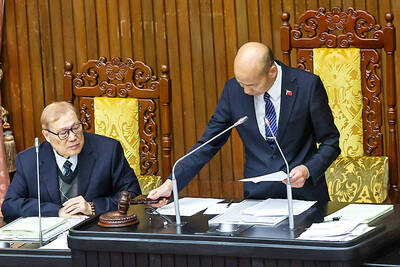Taiwan-Japan relations received a boost yesterday after the Japanese Diet voted unanimously to make permanent the current visa-free status for Taiwanese travelers.
A bill granting the special status for Taiwanese tourists was passed by the House of Councilors -- the upper house of Japan's Diet -- early yesterday, after having been approved by the House of Representatives on Tuesday.
According to a statement issued by the Ministry of Foreign Affairs (MOFA), the permanent visa waiver will take effect on Sept. 26 -- the day the current temporary visa waiver is set to expire.
Taiwanese travelers will be allowed to stay for up to 90 days in Japan without requiring a visa.
Japan is one of the top destinations for business travelers and vacationers from Taiwan, and nearly 1 million Taiwanese visit the country each year, according to statistics supplied by the Central News Agency (CNA).
Japan currently grants visa-free entry to citizens from 62 countries.
THANKS
The move was welcomed by Taiwanese officials, who praised Japan for demonstrating its support for Taiwan despite heavy opposition from Beijing.
Chinese officials have regularly lambasted Tokyo over the visa waivers, which were first granted for Taiwanese tourists on March 25 as part of a tourism campaign for the 2005 World Exposition in Aichi Prefecture.
Beijing wanted Japan to grant visa-free status to Chinese citizens, arguing that Tokyo could not negotiate with Taipei over the issue because of the "one China" policy.
However, the Diet refused to consider the Chinese requests, citing frequent problems with illegal immigrants and criminal activity by Chinese nationals.
MOFA spokesman Michel Lu (呂慶龍) urged people in Taiwan to "cherish" their "hard-earned preferential treatment," also cautioning them to obey the law and behave appropriately while in Japan.
The nation's top representative to Japan, Koh Sei-kai (許世凱), also lauded the move, saying that dropping visa requirements was a move calculated to promote the interests of Taiwan and Japan.
Koh said that he hoped the bill was the precursor to "increased bilateral engagement" between Taiwan and Japan, saying that the current method of conducting relations was obsolete.
Japan ended formal recognition of the Republic of China in 1972, establishing a non-official organization, the Interchange Association, to act as its de facto embassy in Taipei. Taiwan also maintains a de facto embassy with an ambiguous title in Tokyo, called the Association of East Asian Relations.
TOURISM CAMPAIGN
The move by Japan to relax visa requirements for Taiwanese tourists is part of a tourism promotion campaign that began in 2002, titled "Yokoso! Japan."
"Yokoso" is Japanese vernacular for "welcome."
The campaign, which is run by a group called the Visit Japan Campaign Headquarters -- an association of government and tourism-association officials, is designed to attract 10 million visitors -- almost double the annual number of foreign tourists -- to Japan by the year 2010.
Taiwan is Japan's second-largest source of foreign tourists.

DEFENDING DEMOCRACY: Taiwan shares the same values as those that fought in WWII, and nations must unite to halt the expansion of a new authoritarian bloc, Lai said The government yesterday held a commemoration ceremony for Victory in Europe (V-E) Day, joining the rest of the world for the first time to mark the anniversary of the end of World War II in Europe. Taiwan honoring V-E Day signifies “our growing connections with the international community,” President William Lai (賴清德) said at a reception in Taipei on the 80th anniversary of V-E Day. One of the major lessons of World War II is that “authoritarianism and aggression lead only to slaughter, tragedy and greater inequality,” Lai said. Even more importantly, the war also taught people that “those who cherish peace cannot

STEADFAST FRIEND: The bills encourage increased Taiwan-US engagement and address China’s distortion of UN Resolution 2758 to isolate Taiwan internationally The Presidential Office yesterday thanked the US House of Representatives for unanimously passing two Taiwan-related bills highlighting its solid support for Taiwan’s democracy and global participation, and for deepening bilateral relations. One of the bills, the Taiwan Assurance Implementation Act, requires the US Department of State to periodically review its guidelines for engagement with Taiwan, and report to the US Congress on the guidelines and plans to lift self-imposed limitations on US-Taiwan engagement. The other bill is the Taiwan International Solidarity Act, which clarifies that UN Resolution 2758 does not address the issue of the representation of Taiwan or its people in

The Philippines yesterday criticized a “high-risk” maneuver by a Chinese vessel near the disputed Scarborough Shoal (Huangyan Island, 黃岩島) in a rare incident involving warships from the two navies. The Scarborough Shoal — a triangular chain of reefs and rocks in the contested South China Sea — has been a flash point between the countries since China seized it from the Philippines in 2012. Taiwan also claims the shoal. Monday’s encounter took place approximately 11.8 nautical miles (22km) southeast” of the Scarborough Shoal, the Philippine military said, during ongoing US-Philippine military exercises that Beijing has criticized as destabilizing. “The Chinese frigate BN 554 was

LEISURE: The new law adds Confucius’ birthday, the anniversary of the Battle of Guningtou, Constitution Day and Little New Year as national holidays The Legislative Yuan yesterday passed new legislation adding four national holidays and making Workers’ Day a national holiday for all sectors. The Chinese Nationalist Party (KMT) and the Taiwan People’s Party used their combined majority in the legislature to push the jointly proposed draft through its third and final reading. This new law supersedes the existing regulations for the implementation of memorial days and state holidays, which are administered by the Ministry of the Interior. The new law recognizes Confucius’ birthday on Sept. 28, the anniversary of the Battle of Guningtou on Oct. 25, Constitution Day on Dec. 25 and “Little New Year,”